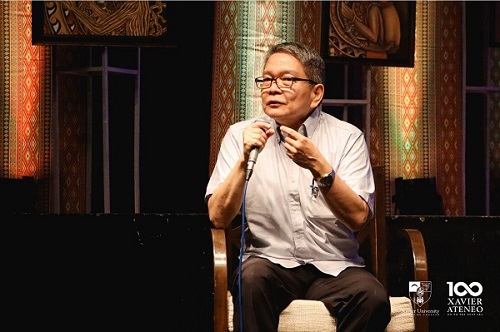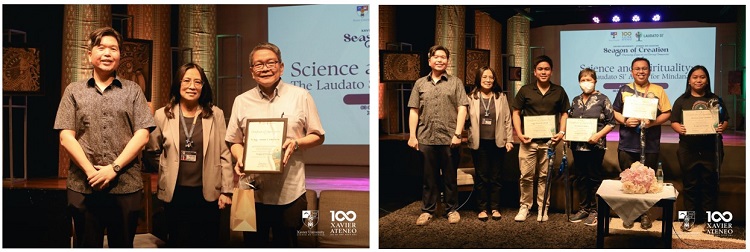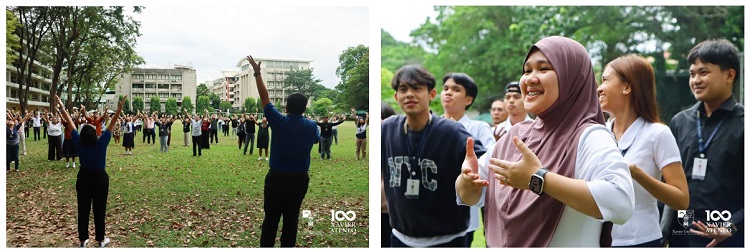By Victoria Melissa C Pulido
“When you have a very shallow view of science or spirituality, then yes, the two will clash (magaaway yung dalawa), but if you have a very deep view of science and faith [spirituality], then those two will not be in conflict.”
These were the words of Fr Jose Ramon “Jett” T Villarin, SJ, during his talk in the forum titled, “Science and Spirituality: Laudato Si’ Action in Mindanao” which served as the culminating event for Xavier University-Ateneo de Cagayan’s month-long Season of Creation Celebration. Fr Jett is the former President of Xavier Ateneo and currently serves as the Executive Director of the Manila Observatory.

In his address, he emphasized the importance of viewing science and spirituality not as warring forces, but integrated. He posed the question: “Is there a connection between the suffering of people and the suffering of nature?” This prompted reflection among the audience, which included students, faculty, formators, and invited guests from other academic institutions, government offices and civil society organizations in the city. Fr Jett answered by highlighting the root cause: “We suffer because of our selfishness.” He stressed that the lack of awareness regarding our responsibility to creation has led us to become detached from our true nature as stewards of God’s creation.
According to Fr Jett, nature is not the cause of our suffering. Instead, the problem lies in our non-recognition that what we have are gifts from God, the Giver. He added: “If you destroy the gift, you also destroy the giver.” Therefore, the crisis confronting our environment is not solely a material one, but a spiritual crisis, as we have lost our grounding in God, the Creator and Giver of life on earth.

Fr Jett also shared several concrete action points for fully living out our responsibilities as stewards of creation:
Take care of things, or repair things that are broken. We are called to care for things, and repair that which is fractured. Our world is damaged by greed and overconsumption and by engaging in discernment, acknowledging our own brokenness, and addressing our disconnection from God’s creation, we can begin to tackle society’s larger ills.
Discover the joy in becoming simple. Citing Pope Francis as an example of simplicity, Fr Jett noted how difficult it has become for people to find happiness due to the constant pursuit of luxury. He referenced the Pope's argument that society promotes a “culture of waste.” We combat this by embracing simplicity, taking only what is truly needed, that which feeds not just our bodies, but our souls, always striving for the Magis in our use of resources.
Be critical. Advertisements often encourage consumption without critical thought, confusing our needs with our wants. Human desires are seemingly endless. The call is for people to be more mindful and critical of the influences around us that push us to desire more than what is truly necessary.
Take care of your health. This involves weighing what is entering both our body and our mind. People have become gluttonous not only with food but with knowledge that may be detrimental, leading to stress, anxiety, and overwork. These habits negatively affect our mental, physical, and overall health.
Help each other in taking care of what is for all (Magtulungan sa mga bagay-bagay na para sa lahat). We must learn to cooperate and look after things that are used and enjoyed by everyone, such as public roads and pathways. These shared spaces are not exclusive; they belong to the common home. It is our collective responsibility to ensure the integrity of these resources so that all may benefit.
Small actions matter. Fr Jett emphasized that small actions compound. No matter how overwhelmingly vast society’s problems appear, one must not underestimate the small steps an individual can take to correct them. Small actions, when done by many, become big actions and contribute significantly to solutions.
Vote Right (Bumoto nang tama). He lamented that people, even the educated, are often swayed by empty promises, leading them to elect leaders who lack the competence and moral decency to alleviate the situation of Filipinos. Voting right is crucial because leaders make a substantial difference, for example, a single signature can profoundly affect lives and communities. According to Fr Jett, we need leaders who prioritize the common good over their own tribe or family. However, goodness is not enough; leaders must also be competent. It is easy to draft laws, but execution often fails. Leaders must have the competence to make decisions for the common good, especially for the benefit of those marginalized.
Rest, be grateful, and pray. Prayer does not need to be fancy; being grateful is prayer enough for the blessings we receive. If people cannot savor and relish life, they miss the opportunity to appreciate and be grateful. Humans are not machines, and even the Bible prescribes rest or Sabbath. Extending this principle to our common home, the land, too, requires rest to sustain its ability to give life.
To conclude his talk, Fr Jett showed a photo of a six-year-old Japanese boy, the smallest donor, who broke his piggy bank to share his savings with those affected by Typhoon Yolanda. Fr Jett shared that if children can learn to share, then society is not hopeless.
He added: “Despair is the luxury that the poor cannot afford to have. Hopelessness is a language the poor cannot speak.” Because of this, those in a position to act have a moral imperative to do something, especially for the poor. Fr Jett ended with a call for young people not to lose hope and speaking in a room filled with parents, educators, and government workers, he invited everyone to continue planting seeds of hope for the children.
The forum also included impressions from guests representing the Church, the academe, the Local Government Unit (LGU), and Civil Society Organizations (CSOs), all of whom affirmed the interconnectedness of ecology, science, and spirituality.
Ms Donna Echalico, Coordinator of the Integral Ecology of the Archdiocese of Cagayan de Oro’s Social Action Center, resonated with the call for self-care, acknowledging its importance in her work. She shared that "Science and Spirituality are not in conflict. It is interconnected, and in this, no one should be left behind. Science gives us the knowledge of how to take care of the earth, and Spirituality gives us the heart to do so."
Engr Primo Revilla, Division Chief of the Energy Efficiency and Conservation Division, City Local Environment and Natural Resources Office (CLENRO), emphasized that environmental stewardship is a common responsibility, echoing the city's motto: "ang limpyo na syudad, atong responsibilidad" (a clean city is our responsibility). He highlighted CLENRO's work across various sectors, forest protection, air quality, waste control, and energy efficiency, but noted that spirituality teaches us how to thrive and persevere despite the gaps and challenges we face.
Mr Tristan Gabriel Acuzar, Coordinator for Pastoral Ministry and Environmental Advocacy Affairs at Kong Hua School, shared a personal experience that shaped his commitment to Laudato Si'. He described how life-changing it was to live with the Lumad community in Bukidnon under the mentorship of Fr. Pedro Walpole. He stressed that Kong Hua School's educational mission focuses on the future, ensuring that the younger generation has a thriving environment to enjoy. He emphasized that students aren't just there to learn, but to eventually take action. Kong Hua is one of the academic institutions enrolled as a Laudato Si' school.
Ms Irene Jahn Udtohan, Head of Hirang ng Hiraya from Our Mother of Perpetual Help Parish-Barra, underscored the necessary “leap of faith” their organization took in pursuing their environmental advocacy, noting that it is faith that keeps them going. She credited faith and spirituality for sustaining their organization and expressed renewed hope in the idea that small efforts should not be dismissed, especially efforts coming from the youth who are often discredited for their idealism.
Following the guests’ impressions, the program shifted to a presentation on Xavier Ateneo’s institutional commitment to Laudato Si. Engr Dexter Lo, the Vice President for Social Development and Chairman of the University’s Laudato Si’ Committee, shared the milestones and challenges of the university’s seven-year Laudato Si journey, which began in 2022. He reiterated that this endeavor is not just for the university to take, but requires a "personal commitment to renewal and reconciliation with creation."

Asked about the learnings and insights gained from the forum, Ms Janelle Dawn Omongos, a first-year international student, shared how the forum brought her back to her early years as a student leader in senior high school, where they championed a school-based environmental campaign. She said: “The theme of care for our common home resonates deeply with me, highlighting the importance of global dialogue around our daily actions and decisions. It reinforces the idea that each small effort contributes to a larger movement toward sustainability and environmental stewardship.”
The forum was beautifully capped with a movement prayer led by Dr Samuel Macagba and Dr Junefel Colonia-Macagba. Attendees participated through mindful movements, symbolically connecting with creation and offering their praises to the Creator.
As Fr Mars P Tan, SJ, shared in his opening message: caring for creation is synonymous with caring for God, who is both the Giver of life and the Gift itself. The day’s events affirmed that this commitment hinges on viewing science and spirituality not as conflicting forces, but integrated partners. Our mission now is to unite the scientific knowledge that informs our actions with the spiritual imperative that compels them, paving the way for healing for both humanity and the planet.
